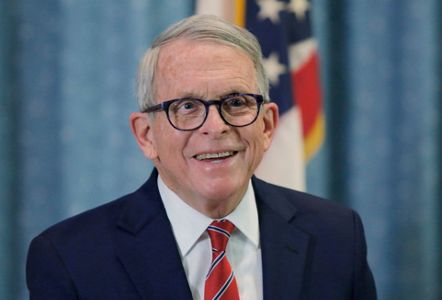TOLEDO, Ohio (AP) — The school closures, stay-at-home mandates and curfews that Ohio Republican Gov. Mike DeWine imposed early in the pandemic still infuriate Donald Trump's most loyal supporters. His dismissal of the former president's stolen election lie and criticism that Trump “poured gas on the fire" before the U.S. Capitol riot put him at odds with many GOP voters.
But that may not be enough to topple DeWine in the state's upcoming May 3 primary.
Despite some notable splits with Trump, he is entering the final stretch of the campaign in a strong position to win the GOP's nomination for another four-year term. He's facing challenges from three lesser-known conservatives who could essentially split the far-right faithful, with DeWine potentially emerging as a Republican who crossed Trump's base and managed to survive.
“Whatever happens in the election happens, but this was a crucial time in our history,” DeWine, 75, said in an interview, referring to his management of the pandemic.
The dynamics harken back to an era when Ohio prized middle-of-the-road candidates, making it a bellwether for presidential elections for decades. But that reputation for moderation eroded under Trump, who won the state in the 2016 and 2020 campaigns. The higher-profile race for an open U.S. Senate seat is perhaps more reflective of Ohio's rightward shift as candidates have spent months trying to out-Trump one another as they seek his coveted endorsement.
So far, the former president has stayed quiet in the governor's race, a credit to DeWine’s ability to walk a fine line of expressing support for Trump while also keeping him at a distance. Despite their different approach to the pandemic, which Trump sought to minimize, there was only one hint of a genuine rift between the two men.
That was when DeWine suggested in November 2020 that it was time for Trump to acknowledge that Joe Biden had won the White House. Trump’s response was a tweet wondering who would challenge DeWine in this year’s primary. “Will be hotly contested!” Trump predicted.
Trump announced this week he'll be in Ohio for an April 23 rally ahead of the GOP primary. DeWine said on Thursday that he's not sure if he'll be able to make it because he already committed to attending a 200th birthday celebration for another ex-president, Ohio native Ulysses S. Grant.
Former U.S. Rep. Jim Renacci, who served four terms in Congress, was thought to be DeWine’s biggest threat, especially if he could win an endorsement from Trump after getting his backing four years ago in a failed U.S. Senate bid. But some recent polls show Renacci splitting the anti-DeWine vote with Joe Blystone, a farmer who jumped in the race early and built a following in rural Ohio.
Much of the frustration toward DeWine has bubbled up in Republican-dominated rural counties where mask mandates and school shutdowns were met with resistance. Those areas hold the fewest votes yet carry significant weight because Republicans often pile up big enough margins to negate the strong Democratic turnout in the state’s big cities.
“They say in politics people forget things. Down here they haven’t forgotten,” said Dennis Cooper, a member of the Clermont County Republican Party, which overwhelmingly endorsed Renacci over DeWine earlier this year. “It wasn’t just one thing. It was one thing on top of another that made no sense.”
Still, DeWine has a huge fundraising advantage and a network of supporters built from a political career spanning more than 40 years. Both are why more prominent Republicans in the state decided against challenging him even as dissatisfaction grew.
Ryan Stubenrauch, a former DeWine policy adviser who's now a GOP consultant, thinks the anger is coming from a vocal minority.
“There's a whole lot of people mad at a lot of things. The last two years have been really rough on people,” he said. “I don’t know if the party has changed or all of our politics have shifted over the last two years.”
One thing that hasn't changed, he said, is DeWine. “He values life just about over everything,” Stubenrauch said.
He’s an old-school conservative who just months into his first term as governor signed into law what at the time was one of the most stringent abortion restrictions in the nation.
DeWine has leaned on his pro-life stance to explain why that also includes protecting people from COVID-19. He was widely praised early in 2020 for not downplaying the pandemic when he became the first governor to shut down schools statewide.
But the mood soured among Republicans who quickly tired of mask mandates and health orders that closed many small businesses but allowed large retailers to remain open. They saw him putting in restrictions that ran counter to what they were hearing from Trump and conservative governors such as Ron DeSantis in Florida and South Dakota's Kristi Noem.
A hostile state Legislature dominated by DeWine's own party overrode his veto of a bill weakening the governor's ability to respond to public health emergencies.
Renacci said DeWine prioritized “fear over freedom.”
Some conservatives have vowed never to vote for DeWine again, according to a handful of county GOP chairs, even if that means sitting out in November.
The winner of the Republican primary will face the Democratic nominee, either former Cincinnati Mayor John Cranley or ex-Dayton Mayor Nan Whaley.
“They're not going to vote again for someone who has disappointed them and not represented them well,” said Shelby County Republican Chairwoman Theresa Kerg. “I think people are frustrated and tired of just accepting whoever is given to them.”
___
Associated Press writer Julie Carr Smyth in Columbus, Ohio, contributed to this report.
Copyright 2022 The Associated Press. All rights reserved. This material may not be published, broadcast, rewritten or redistributed without permission.





